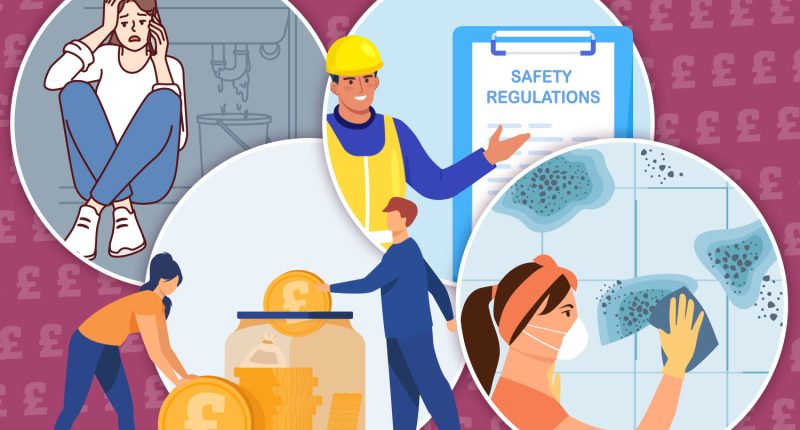RENTERS may feel at the mercy of their landlords, but there are plenty of rules they need to follow or you could get compensation.
From mould to “risky” deposits, we round up everything you need to know.
It comes as reforms to the private rented sector moved closer to becoming law on Wednesday this week.
However, MPs and campaigners criticised the “indefinite delay” on plans to abolish so-called “no-fault” Section 21 evictions, which were first announced in 2019.
The Bill’s original aim was to end fixed-term tenancies, introduce a decent home standard, establish a new ombudsman and protect families in receipt of benefits from discrimination.
It also included the long-promised plan to end tenants being forced from their homes under Section 21 notices.
Read more on renting
However, the Government wants to delay the ban until it’s sure courts have the capacity to deal with new cases.
Below we round up the current rules for landlords.
1. Pay you compensation for a mouldy home
Renters in England and Wales can take their landlords to court over problems including cold and damp homes.
Mould is a hazard and can cause respiratory problems.
Most read in Money
The Homes (Fitness for Human Habitation) Act, which came into force in 2019, means landlords must make sure their properties meet certain standards.
How much compensation you get for housing disrepair depends on your circumstances and how bad the problem is.
It is usually calculated as a percentage of the rent you paid while living in the conditions.
A completely uninhabitable property could get 100% of rent as compensation, but this is rare.
More typically, compensation would be between 25% and 50% of your rent, according to legal experts.
Still, tenants will have to pay court fees unless they’re entitled to free legal aid, but you’ll get some back if you win your case.
Last year, The Sun shared how a mum-of-three got £3,000 in compensation after her landlord failed to fix her mould-riddled home.
2. Make repairs
Your landlord is responsible for most of the repairs that need to be carried out on your home.
These include fixing issues with the electrical wiring, gas pipes and boilers, heating and hot water, sinks, baths and toilets.
Meanwhile, tenants are responsible for repairing their own furnishings if the property is let unfurnished.
You may be entitled to compensation from your landlord if they fail to carry out repair work within a reasonable time, or if your house is unfit to live in due to poor conditions.
This may be in the form of a rent reduction or payout.
If your landlord won’t agree, renters can take legal action to claim compensation either during the tenancy or after it ends.
3. Cap your deposit
Landlords often require you to put down a deposit if you’re looking to rent a house, whether it’s hundreds or thousands of pounds.
Following a crackdown in 2019, tenants can now only be charged a maximum of five weeks’ rent as a deposit.
This increases to six weeks if your annual rent is £50,000 or more.
4. Keep your deposit safe
There are also rules when it comes to how your deposit should be kept safe – and if landlords flout these rules, you could be owed thousands of pounds in compensation.
In fact, landlords legally have to store your deposit money in one of three government-backed tenancy deposit schemes.
These are the Deposit Protection Service, MyDeposits and Tenancy Deposit Scheme.
Your landlord has to provide information about which scheme they use within 30 days of you paying it.
And if your cash isn’t put into one of them, you could be entitled to compensation of up to three times your deposit amount.
Find out more about how to claim in our guide.
At the end of the tenancy, your landlord must also pay it back within ten days of you both agreeing how much you’ll get back.
Your landlord can only keep money from your deposit if there’s a problem, for example, if you’ve damaged something.
5. Carry out electrical safety tests
Landlords must make sure all gas and electrical equipment is safely installed and maintained.
They are also required to fit and test smoke and carbon monoxide alarms to keep the tenants safe.
Those who fail to carry out electrical safety tests on properties they rent out could be fined up to £30,000.
6. Not charge for admin costs or renewal fees
Estate agents and landlords are banned from charging tenants extra fees to cover administration costs, such as renewing a tenancy.
Other charges they cannot pass onto tenants include viewing a property, and for carrying out reference checks and guarantor requests.
The ban has been in place for new rental agreements since June 2019 and for existing agreements from June 2020.
It means fees can only be charged for lost keys and late rent, for example.
READ MORE SUN STORIES
Tenants who think they have been wrongly charged can complain to trading standards, which is part of their local council.
They have the power to fine a landlord or agent, and ban them from renting out properties again if they break the rules more than once.
How to settle a dispute with your private landlord
THE first step is to try and talk through the problem, but if this does not go to plan you can write a formal letter.
Simply explain the problem and what you want them to do to resolve it.
If unsuccessful, the next step is to complain to your local council, which can help with issues regarding:
- repairs that cause a risk to your health and safety not being done (e.g faulty electrical wiring not being fixed)
- illegal eviction
- harassment
- dishonest or unfair trading behaviour
If your landlord still doesn’t sort out your problem or if the council can’t help, you might be able to take court action.
Just remember this can be expensive so make sure it’s the right option for you.
You can get free advice from Shelter and free advice from Citizens Advice about disputes and housing problems.
In Wales, you can contact Shelter Cymru.
Civil Legal Advice (CLA) can offer some people free and confidential services as part of legal aid, if you’re in England and Wales.
A solicitor can also help you too, but they might charge a fee.
If you’re a social tenant, you should complain to the Housing Ombudsman.
Do you have a money problem that needs sorting? Get in touch by emailing [email protected].
Plus, you can join our Sun Money Chats and Tips Facebook group to share your tips and stories








